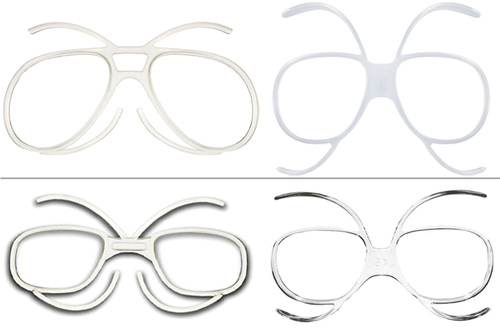Do I need ski goggles?
Have you ever watched a Winter Olympics skiing competition where the skiers did not wear goggles? If the world's best skiers wear ski goggles, you can be sure that they understand the importance of great goggles. Follow their example, for in this case, you indeed can do what the Olympians do.
Ski Goggles Provide Eye Protection
Ski goggles protect your eyes in two ways. First, ski goggles offer protection against flying debris, such as the snow pushed at you by another skier. Second, they help protect the moisture layer on the surface of your eye. Wherever there is snow and temperatures below freezing, the humidity is also very low, which means your eyes can get dry very quickly. Add to the natural low humidity of below-freezing temperature air the wind cold wind whipping across your face as you go down a slope. That wind can blur your vision by making your eyes tear, the natural reaction of your eyes to fast, dry air. You really do need goggles to protect against that cold dry air! However, good ski goggles will also allow for some air venting, because people perspire, and without that venting, the ski goggles would soon fog over.
Ski Goggles Should Fit Properly
Another feature of good ski goggles is that they should fit your face and head well. You may be wearing them for hours, so an uncomfortable fit will mean that when you eventually take them off, you probably will also experience a period of discomfort later. How do they fit over your nose? How do the straps go around your head? Do the ski goggles fit snugly on the face, without any points of contact feeling especially hard? Are there any points where the goggles do not even touch the skin, leaving air gaps? How do they fit with other head covering you wear?
Do you normally wear prescription glasses or contact lenses? That will also affect the choice of ski goggles you can wear. Certain types of ski goggles can accept universal prescription goggle inserts. The advantage of these is that they do not fog up as much. Goggles do exist that can fit over regular eyeglasses, but they can also fog up. Also, if you change goggles, the inserts can be placed within other compatible goggles.
Ski Goggles Protect From UV
Perhaps the one feature that all good ski goggles have is protection from ultraviolet light. Most people do not at first realize this, but it is easier to get sunburned on a ski slope than on a tropical beach. Why? Because ski slopes are usually thousands of feet higher in altitude, which means less air to stop or filter harmful UV from the sun. UV protection, therefore, is even more important when in the mountains.
Have you ever looked at a large white building on a very bright, sunny day? Was it not difficult to really look at it from certain directions? Skiing on the snow makes that condition even more difficult. Therefore Goggles-n-More also has ski goggles aimed at different kinds of light conditions. Frequent skiers will use one color on overcast days, and a different color on sunny days. The different colors will increase vision under different lighting conditions. The lighter the color of the lens, the more visible light will go through; light-tinted goggles are good for cloudy environments. Darker tints are better for sunny days. A clear goggle lens would work best at night. When purchasing your goggles, carefully consider the kinds of ski conditions you might encounter, for that will help determine what color of goggle lens you should choose.
So yes, if you do any snow sports, you need a good pair of ski goggles. Be careful not to go too cheap on what you purchase, for you will have only one set of eyes that need to last you your whole life.
Prescription Swim Goggles – Sports Goggles – Ski Goggles
Leader in Prescription Goggles and Glasses
Kids RX Swim Goggles – Adult RX Swim Goggles – Prescription Sports Goggles - RX Ski Goggles

 Canadian Dollar (CAD)
Canadian Dollar (CAD)
 Euro (EUR)
Euro (EUR)
 British Pound (GBP)
British Pound (GBP)









